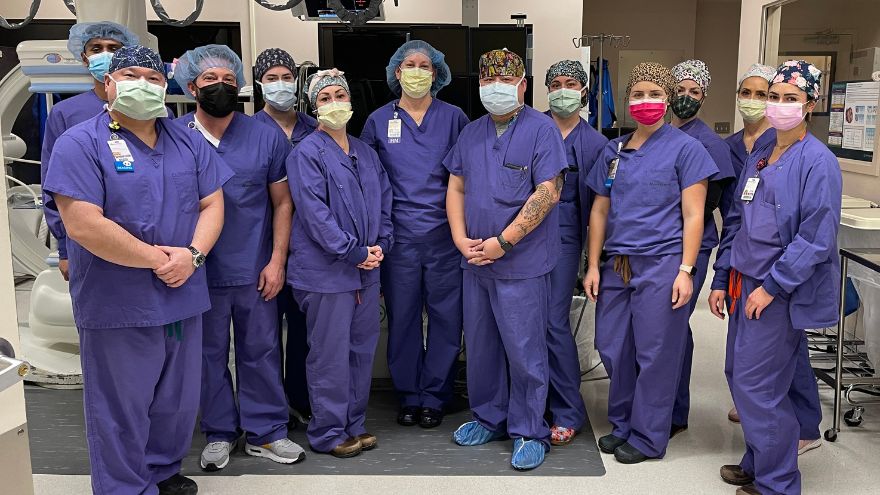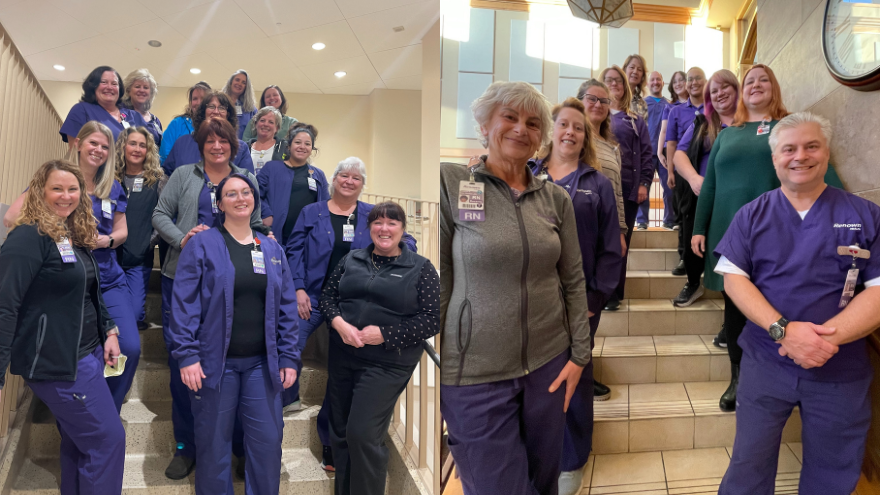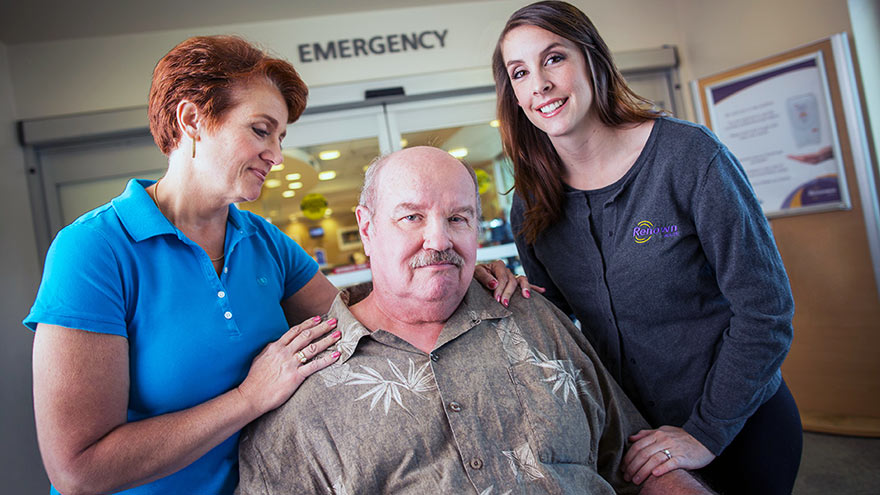Search
-
Department Spotlight Cardiac: Catheterization Lab
February is American Heart Month, but our incredible heart heroes are here to serve you all year long. So please join us in honoring the Cardiac Cath Lab team at Renown Health! At the core of who we all are, we find the heart: one of the largest sources of life that gives us the blood and oxygen we need to live full and healthy lives. When the heart doesn’t function to the best of its ability, a delicate approach led by cardiac experts might be necessary. These individuals can not only save lives but also help facilitate a higher quality of life. The team entrusted to protect that vital source of life includes the hard-working and talented individuals in the Cardiac Catheterization Lab (a.k.a. “Cardiac Cath Lab” or “Cath Lab”) at Renown Health. These team members are known for their expertise, precision and quick-thinking in emergencies. When it comes to the function of your heart, you are in the best hands with this team. Their passion for Renown’s mission of making a genuine difference in the health and well-being of the people they serve is a testament to what they do every day. Cardiac Champions Whether the procedure is emergent or planned, the Cardiac Cath Lab wears many different hats. The team is a well-coordinated group of nurses, imaging professionals, electrophysiology technologists, interventional technologists and more who band together to provide a diverse array of services, including stent placements, pacemakers, balloon pumps, interventional angioplasties, TAVRs and of course, catheters. “A day in the life in the Cath Lab can go various ways,” said Erica Drummer, RN at Renown Health. “Every day, you are either a part of the electrophysiology team, doing cardiac ablations and placing devises such as pacemakers; the structural heart team, which includes MitraClips for mitral regurgitation and TAVRs; or the heart catheterization team, which includes diagnostic angiograms, heart catheterizations, angioplasties and stents for clogged arteries.” With the wide variety of cases the team sees daily, an average day in the Cath Lab consists of many moving parts. “We handle cases from left and right heart catheterizations, where we can diagnose and fix the artery right then, to electrophysiology cases like heart ablations and pacemaker implants, all the way to emergency STEMI (heart attack) patients,” said Michael Blankenship, Electrophysiology Technologist at Renown Health. “We do so many things in the Cath Lab,” added Laurel Douglas, RN, Imaging Manager at Renown Health. “We ensure we have 24/7 coverage for emergencies, as we often have to act at a moment’s notice to care for emergent situations.” Many of those emergency situations involve heart catheterization. If someone has a heart attack, the team immediately steps in to place stents to open the coronary arteries that are causing the attack. If a patient’s heart needs any assistance during an emergency, the team can place devices such as Impella (temporary ventricular support) or intra-aortic balloon pumps. Renown is a major advocate for advanced medical technology, and the Cardiac Cath Lab team embraces these technologies to perform life-saving procedures, all while working together as a cohesive unit. “We work amongst each other to ensure sterility, safety and the best outcome for each patient,” said Zohra Benbrahim, RN at Renown Health. “We try to fit in as many cases as possible into the workday, and sometimes after hours, so patients can get the care they need.” “Each team usually has 3-4 members, and each member has a critical job to carry out in order to implement excellent cardiac care,” added Erica Drummer, RN. “Many of our patients tell us that we all work well together, and I couldn’t agree more. We have become like a well-oiled machine or a NASCAR pit crew.” Naturally, patients undergoing any heart procedure might feel frightened and anxious. Never fear – the compassionate Cardiac Cath Lab team is here to ease those fears throughout each patient’s entire visit. Their main solution? Communication. “Being a patient in the Cath Lab can be daunting,” said Erica Drummer, RN. “When we have patients who may feel scared or have concerns, we try our best to connect with them, keep them informed and educate them on the procedure and the step-by-step process, including what they may feel before, during and after.” “Overall, we try to keep spirits light,” said Zohra Benbrahim, RN. “Our team is excellent at explaining the procedure as it is happening. We also advocate for comfort throughout the procedure, which helps tremendously with anxiety, including giving patients warm blankets and music of their choice!” Our experts in the cardiac Cath Lab make sure that no stone goes unturned when it comes to optimal heart function for every patient. Together, the team mends hearts and saves lives, day in, day out. A Growth Mindset Always learning, always improving, always reaching new heights – that's the Cardiac Cath Lab team. This team’s accomplishments speak for themselves on both a local and national scale. “Over the years, we have achieved several milestones, including becoming a STEMI Receiving Center, gaining our Chest Pain Center Accreditation (which is achieved by Cath Labs who provide emergent percutaneous coronary intervention for heart attack patients 24/7) and having our accredited electrophysiology program,” said Laurel Douglas, RN. “We also offer services that other facilities do not offer. We have brought in several new procedures to the Cath Lab over the years. This is impactful, as the community members get to stay here for treatment.” The Cath Lab team is anything but ordinary. There is never a dull moment in this department, and despite an ever-growing caseload, the team is always ready to rise to the challenge and continue pushing to surpass the average. “I am so proud of my team for providing care for such sick patients,” said Zohra Benbrahim, RN. “We never really know how the day is going to go because emergencies happen, and things always change. Recently, we had a record high volume of cases, and my team powered through these busy weeks like champs.” “We strive to get our STEMI door-to-balloon times at or below 60 minutes,” added Erica Drummer, RN. “Door-to-balloon time refers to the time from when a patient arrives in the ER to the time the Cath Lab has a catheter guide wire crossing the culprit lesion in the coronary artery that is causing the heart attack. The national average (and current guideline) is 90 minutes, so our 60-minute time is a notable accomplishment for us.” The importance of staying on top of your heart health comes center stage during American Heart Month, which is a prime opportunity for our cardiology professionals to educate the community and help them grow their cardiac knowledge. The cardiac quality team participates in community events throughout the month (and beyond!) to raise awareness for cardiac health. The team also outreaches to other health systems and healthcare partners to highlight what Renown has to offer in the way of heart care. Each Cath Lab team member always reminds patients about lifestyle choices and diet changes that can improve cardiovascular health, and they take this outreach with them all around Renown Regional Medical Center as well, walking through the hallways promoting many different ways of living a heart-healthy life. The journey continues! The team will soon welcome a new Cardiac Cath Lab at Renown South Meadows Medical Center. The new lab will allow our experts in heart care to treat patients at our South Meadows location experiencing a heart attack and needing immediate intervention to open vessels in their hearts. The team is looking forward to embracing even more access to emergent cardiac care for our community at large. Learn more about how Renown is building more ways to care for our community. Now Hiring for Heart Heroes Those looking to join a caring, committed and tight-knit group of cardiac care professionals will be in good company with the Cath Lab team. According to the members of this department, being a quick-thinking, dependable team member is key to predicting a successful Cath Lab professional. “A good coworker communicates with everyone and is able to be flexible when things get hectic,” said Zohra Benbrahim, RN. “Our team stays so close with each other because of everyone’s ability to recognize where help is needed. Especially in the Cath Lab, it is important to be always aware of the patient’s vitals and clinical presentation so you can speak up if you notice changes. There are always new procedures or products coming out that become integrated into our practices, so it’s also good to welcome new policies and be adaptive.” “We are a small team, and everyone sees each other as a friend,” added Laurel Douglas, RN. “We all know we will need help at some point, whether it be covering an on-call shift or helping during a procedure, so we all help each other. Teamwork and positive attitude are really what makes you a good team member.” Not only are these individuals dedicated to impacting the lives of patients with the very organ that beats life into them, but they also are devoted to Renown – and it shows. “I started working for Renown when I was 19 years old, and Renown was the medical system I went to for care; as I spent more time working here and becoming a part of the community, I could not see myself working anywhere else or getting care at any other hospital,” said Zohra Benbrahim, RN. “I truly believe Renown provides the best care and best serves the growing community of northern Nevada.” The Cath Lab team members agree that Renown is a great place to both start and continue your career. Many of them have taken advantage of Renown’s training and educational opportunities, which in turn have helped them expand their knowledge to better serve the community. “I chose to work at Renown because it gave me the place to grow in my career and experience different avenues within my career,” said Michael Blankenship. “I first started off as a student here, and I quickly realized that everybody I worked with genuinely cares for our patients. I started off in x-ray seeing patients and eventually did rotations up in the operating room, and I got hired full time in the Cath Lab. After a short time being here, I was crossed trained in the electrophysiology lab, where I furthered my knowledge in my career.” This dynamic department is actively hiring, and many open positions are sign-on bonus eligible. The team cannot wait to welcome you to their, as Erica Drummer puts it, “well-oiled machine.” “Being a Cath Lab nurse is very rewarding, especially when you’re able to be a part of a team that can save someone’s life,” Erica closes.
Read More About Department Spotlight Cardiac: Catheterization Lab
-
Department Spotlight: Surgical Preadmission
Heading into surgery of any kind can bring along feelings of intimidation. With a best-in-class surgery team at Renown Health, patients rest assured that they are in the most capable hands for their entire procedure from start to finish – and while the physical preparation is vital, mental and emotional preparation is equally as important to ensure each patient has a smooth and comfortable experience. The Surgical Preadmission department (a.k.a. “preadmit”) at Renown Regional Medical Center and Renown South Meadows Medical Center is a dynamic and compassionate group of nurses, case managers, chart managers and more who are dedicated to guiding each patient through the surgical process. With extensive knowledge and expertise under their belt, the teams are equipped to make a genuine difference in the health and well-being of all patients, for all surgeries, at all times of the year. Surgery Starting Ground The Surgical Preadmission teams are crucial aspects in the successful outcome of every surgical procedure. Comprised of skilled healthcare professionals, this department is dedicated to providing comprehensive support and care before heading into the pre-operating room. “Our job is to prepare every patient for surgery, make sure all their pre-surgery testing is done, ensure they understand their fasting and medication instructions, have had their questions answered, have a ride home and know what to expect during surgery and after so their recovery can go smoothly and without complications,” said Debra Bennett, RN, Supervisor of Surgical Preadmission at Renown Regional. “Each patient is unique, so each experience is different.” Our preadmit nurses are the masters of communication, directing thorough assessments – including medications, tests and clearances – and addressing any questions or concerns patients may have, never missing the opportunity to inform them of exactly what they will expect in surgery. “I do a complete history on every patient while giving them detailed pre-operating instructions and helping them answer any questions to the best of my ability,” said Nancy Hilts, Surgical Preadmission RN at Renown Regional. “I am proud to be able to help allay their fears and concerns using my 30 years of pre-op experience. I offer an avenue for them to feel comfortable opening up to me.” “We always tell patients that they have great surgeons and a fantastic team that will be watching over them and taking care of them every step of the way,” added Jon Capallupo, Surgical Preadmission RN at Renown South Meadows. “We also give them plenty of educational handouts and video content, in addition to verbal instruction, to ensure they are as prepared as possible.” The nurses then pass the reigns onto the chart managers, who prepare the charts for surgery and ensure all documentation is up-to-date before sending them to the pre-operative team. The expert surgical case managers also step in to prepare a thorough discharge plan, along with reviewing pre-operation orders for status, consent, codes and more. The team does several of these initial visits virtually, and they are looking forward to soon phasing all preadmit case manager preliminary visits into a virtual model. From assisting the pre-op and post-anesthesia care unit (PACU) teams with discharge planning concerns to helping on the outpatient side with anything from oxygen equipment and catheters to transportation issues and those experiencing homelessness, our pre-admit case managers are always up to the challenge. "We are true patient advocates, alleviating concerns and fears along the way,” said Mary Carl, RN, Case Manager at Renown Regional. “Just to name a few things we do on a daily basis, we see our total joint and non-weight bearing patients during their preadmission appointment, so they are aware of the medical equipment they need and if it is covered by insurance; provide education for Aspira catheters and gastrostomy tubes; advocate to ensure tube feeding and dressing changes are set up for hospice and home health patients; and escalate concerns of patient safety to ensure a safe discharge.” In the midst of it all, there is never a dull moment in the preadmit teams. At Renown Regional alone, the preadmit professionals see more than 1,600 patients a month – and each one has a hyper-personalized experience with their very own preadmit team. “Many times, we are the first impression a patient has on our organization; after all, we touch more than 97 percent of patients that are scheduled for surgery, cardiac catheterization lab procedures or interventional radiology,” said Amy Schler, Surgical Preadmission RN at Renown Regional. “We also collaborate with many other departments in the hospital as well, from surgeons and anesthesiologists to case managers and nurse navigators. Our work in preadmit impacts the entire surgical process.” Holding a diverse array of experiences, our preadmit department plays an integral role in our commitment to providing the highest quality of care to every patient. Knowledge is Power Heading into surgery feeling fearful and worried is normal for any patient. However, how would you feel knowing that each individual member on your preadmit team has, on average, 23-25 years of experience in the field? This is the reality for our Surgical Preadmission department – and they put that vast knowledge to great use to bring a sense of calm to patients. “Our team members have worked in various departments within our organization, and they bring a wealth of knowledge that we share with each other, and most importantly, with our patients,” said Amy Schler, RN. “If you have hundreds of years of nursing experience, you can speak not only as a nurse but also as a patient. It allows you to give a more personal perspective on what patients can expect in their recovery. Being able to assess their emotions and provide feedback to our pre-op and PACU teams help the patient have a better experience.” “Many of our nurses have close to 40 years of experience each, and they have an extremely large knowledge base since we see patients from newborn to geriatric and from easy procedures to complex surgeries,” added Debra Bennett, RN. “Another great aspect of our team is the varied nursing backgrounds we all hold – surgery, pre- and post-op, labor and delivery, pediatric intensive care, cardiology, gastroenterology, urology, cardiac cath lab, home health and everything in between. Communication between departments is so important!” All members in this department, regardless of which clinical area they came from, surgical or non-surgical, can easily translate their skills into the work they do in preadmit – and they only continue to grow. “As a surgical preadmission nurse, I have used my years of experience as a nurse in surgical services,” said Terri Delatorre, Surgical Preadmission RN at Renown Regional. “I started as a floor nurse with orthopedics for 12 years, and then I worked with the PACU for 11 years. This has helped me give great understanding and care to our surgical patients.” “Because we have staff with such a vast knowledge base, we can rely on our years of working within our organization to help alleviate fears that the patient may have,” added Amy Schler, RN. We can prepare them for what to expect in pre-op and PACU and educate them on what to expect post-op, including any barriers they may face. For example, mastectomy patients may not realize they will not be able to raise their arms for 7-10 days post-op, and total knee patients have to navigate stairs and housing access. Helping patients think about barriers at home that they may not have thought about helps them prepare prior to surgery, enhances their healing and provides a better surgical experience.” The preadmit team works closely with our best-in-class surgeons and anesthesiologists, continuing to grow their expertise along the way while learning alongside our talented providers. For instance, when it comes to our Renown South Meadows preadmit department, anesthesiologist Nariman Rahimzadeh, MD provides excellent guidance for the entire team on state-of-the-art anesthesiology practices. “I am very proud of the work we do with Dr. Rahimzadeh,” said Lisa Closson, Surgical Preadmission RN at Renown South Meadows. “Together, we ensure patients are safe for both surgery and anesthesia.” Despite the challenges that come their way – whether it be changes to process and workflow to navigating support for patients after they leave the surgery floor – the preadmit team cleverly uses their collective wealth of knowledge to bring hope and comfort to all patients. “Our nurses are such warm, caring and compassionate humans that do their best to ease any fears and anxieties patients may have,” said Debra Bennett, RN. The Pride of Preadmission The pride of our preadmit team lies in their ability to make a positive impact on all patients they serve. To them, their work is not just a job – it's a calling. And they do it all while working together to elevate their team and performance. “Our team is most proud of the quality of care we provide to our patients and our abilities to troubleshoot difficult situations to ensure they have a great surgical experience here at Renown,” said Mary Carl, RN. The entire department supports each other by working collaboratively and relying on each other’s expertise to provide the best possible care for patients. They understand that their success as a team depends on their abilities to support and help each other. “Our team is awesome here at South Meadows,” said Jon Capallupo, RN. “We can turn to each other for support, and we all work very well with each other. I am glad to be a part of this team.” “I am proud of how well all of us in preadmit works with each other every day,” added Lisa Closson, RN. “We try to make patients feel comfortable from the moment they arrive to the time they leave the department.” The pride that our preadmit team expends goes beyond their departmental limits – these team members are also trusted teachers. They work closely with cancer nurse navigators to teach weekly classes for patients who have been newly diagnosed with breast cancer, coupled with lymphedema prevention and education classes. The team also encourages participation in Renown’s free smoking cessation programs to help their patients learn the risks and benefits of quitting smoking. When not serving patients or teaching classes, you can find many of these team members taking charge of multidisciplinary committees within our health system, including breast leadership, gastroenterology leadership, shared governance, infection control and recruitment and retention. On top of it all, this team certainly knows how to celebrate, with several of their members being a part of their own department-wide Celebration Committee, where they gather for retirement parties, baby showers and team get-togethers. Always active and never passing up a challenge, our preadmit department are shining examples of Renown’s Culture Commitments, especially Caring and Collaboration, and the pride in the vital work they do every day is limitless. “I am so happy my position in preadmit opened up for me at a time when I was really feeling challenged in my career,” said Nancy Hilts, RN. “The team that we have here is amazing. I am so grateful and thankful every day for the opportunity. It is an amazing place to work!”
-
Jakob’s Journey at Renown Children’s Hospital
In August 2016, six-year-old Jakob was admitted to Renown Children's Hospital with what seemed like a common ear infection. Jakob's condition quickly progressed, and he started experiencing neurological symptoms such as difficulty speaking and a full-body shutdown. Doctors, neurologists and specialists from Renown worked with doctors from Stanford, where he was ultimately diagnosed with Bickerstaff brainstem encephalitis (BBE). BBE is a rare, autoimmune response that attacks the nerves in the body due to an acute illness such as a cold, flu or, in Jakob's case, an ear infection. Jakob could not breathe or eat and experienced paralysis on the side of his face, throat, stomach, bowels, lungs and legs. In addition, he started to rapidly lose weight as well as body function. Jakob lost half his body weight which resulted in the need for a Gastrostomy tube. This device is placed surgically and gives direct access to the stomach to give the child the nutrition needed. He also needed occupational therapy, and after three and a half months of ICU respiratory therapy, surgeries and treatments, he was released home to regain his strength. Forever Grateful Anica, Jakob's mom, said, "If it were not for the quick response and unconditional support and compassion from the team at Renown, Jakob would not be here today." Jakob's family is forever grateful to the staff, community and expertise at Renown for their unwavering commitment to their son and family during their most trying time in life. "When I met Jakob on the first day of his illness, so much was unknown. My team and I were worried, as his symptoms were very unusual. His rapid deterioration, after being a perfectly healthy child, was clearly terrifying for his parents. Handing over a child's care to a team of strangers is one of the scariest things that can happen to parents,” said Dr. Kris Deeter, Physician in Chief at Renown Children’s Hospital. “However, Anica and Jeremiah were also very clear that they did not want Jakob transferred somewhere else. So, we used all our resources to care for him, arrive at a diagnosis, and start aggressive therapies. They listened to every word we said, educated themselves, and became partners in Jakob's care. We all became part of Team Jakob, and soon, he proved to us just how strong he was." Today, Jakob is 13 years old and thriving in every aspect of his life. He is currently on the honor roll in school and finds joy in his newfound passion for the violin. He loves spending his free time learning about mixing music, making new friends and traveling to different parts of the country. This summer, he will travel to Europe to explore his passion for culture. The family says, "We owe it all to the family and staff at Renown."
Read More About Jakob’s Journey at Renown Children’s Hospital
-
Learn How to Manage Lymphedema
Katherine Bunker, Physical Therapist and Certified Lymphedema Therapist (PT, DPT, CLT) at Renown, discusses how patients can manage lymphedema with changes to daily routines along with diet and exercise. Lymphedema is a condition that affects millions of people around the world. It is a chronic and progressive disorder that results in swelling of the arms, legs, or other parts of the body due to an accumulation of lymph fluid. Lymphedema can occur because of cancer treatments, surgery, or other medical conditions. Managing Lymphedema Treatments to help reduce symptoms such as pain, swelling and discomfort associated with lymphedema can include compression garments, exercise, skin care, manual lymphatic drainage and pneumatic compression. The goal is to avoid triggering the onset of lymphedema. Lymphedema can present itself immediately after surgery or radiation. It can appear months later or even years later. There are many factors that influence the development of lymphedema which is why prevention is so important. If you have had injury or disruption to your lymphatic system, then: Avoid injuries to the skin near the affected area. For example: wearing gloves during gardening, using bug spray to ward off mosquitos, covering your limbs while playing with pets, keeping nails clean and avoiding cutting too close to cuticle, utilizing electric razors at the armpit (instead of a traditional razor)., Avoid blood pressure readings to the affected limb or request blood pressure to be taken manually, not by a machine. Avoid heat like saunas, hot tubs, sunburns, hot packs, and even massages. Avoid tight jewelry like rings or bracelets, which can be too tight.
-
Three Emergency Room Options for You and Your Family
Renown Health has three emergency rooms open 24 hours a day, seven days a week, ready to serve our community. We checked in with Amy Hawkins, Manager of Clinical Nursing at Renown South Meadows, to learn more about the emergency room experience and how each can accommodate your emergency care needs. 1. Renown Regional Emergency Room The emergency room at Renown Regional Medical Center is the only Level II Trauma Center between Sacramento and Salt Lake City, treating more than 80,000 ER and trauma patients annually. Services Offered: This location offers immediate emergency care covered by general surgeons and coverage by the specialties of orthopedic surgery, neurosurgery, anesthesiology, emergency medicine, radiology and critical care. In addition, tertiary care needs include cardiac surgery, hemodialysis and microvascular surgery. (Patients may be referred to a Level I Trauma Center.) Renown Regional ER Location 2. Renown South Meadows Emergency Room South Reno is expanding, and so is Renown South Meadows ER! Exciting transformations are happening across this campus, including the new 121,000-square-foot specialty care center and upgrades to the existing medical center—expanding care to our patients. Added benefits to the more intimate setting at South Meadows: Smaller ER also means more personal experience. The team traditionally has more time to spend with each patient at the bedside. A smaller campus means convenient parking, as the ER is just outside the front entrance; however, patients are reminded to follow marked road signs when approaching the campus during construction. Most patients arrive by private vehicle versus an ambulance, so we are very accustomed to thinking quickly on our feet. Benefits to new construction: A new Cath lab will allow us to treat patients experiencing a heart attack and needing immediate intervention to open vessels in their hearts. Additional lab and imaging capabilities for our patients Services Offered: This location offers immediate emergency care staffed with board-certified emergency physicians. Patients can expect one-on-one interactions with trusted providers and shorter wait times. All emergency room services are open during construction, and patients are reminded to follow marked road signs when approaching the campus. South Meadows ER Location 3. Renown Children's Hospital Emergency Room This location offers immediate emergency care, with pediatric specialists always on staff. In addition, the Children's ER lobby is ideal for our littlest patients, with a child-friendly atmosphere and vibrant colors to help decrease the anxiety accompanying emergencies. Medical equipment is sized just for kids, and we offer a distraction machine, games and movies to help children cope with what can be a traumatic experience, like getting an IV. In addition, we have Child Life Specialists available to provide emotional support to both children and their families. When to Bring Your Child to the ER: Allergic reactions Asthma attacks Baby under three months old with a temperature higher than 100.4 degrees Fahrenheit Broken bones Burns Choking or poisoning Difficulty breathing Eye injuries Fainting, dizziness and confusion Head injuries Heart attack Rashes Seizures Severe bleeding Severe headache Severe pain Skin infections Stitches Stroke Venomous stings and bites Renown Children's Hospital Location
Read More About Three Emergency Room Options for You and Your Family
-
Your Top 5 Questions about TAVR Answered
Your heart is the muscle in charge of pumping blood to your entire body. This vital organ is made up of chambers, valves and blood vessels. Your heart valves work similarly to a one-way door: they open and close, controlling blood flow in the correct direction through the heart chambers. For patients who have been diagnosed with a heart-related condition like aortic valve stenosis (narrowing), it is important to know treatment options. Most might think open-heart surgery is the only way to treat a heart valve, but many hospitals, including Renown, also offer a minimally invasive procedure called a Transcatheter Aortic Valve Replacement (TAVR). Dr. Abhilash Akinapelli of Renown Institute for Heart & Vascular Health shares his answers to the top five TAVR questions: 1. What causes aortic valve stenosis? Aortic valve stenosis can be caused by a variety of factors. The main reasons being wear and tear of the valve due to aging; genetically abnormal heart valve (bicuspid aortic valve); long-standing high blood pressure; and other reasons like radiation exposure. 2. Am I a candidate for TAVR? Renown’s heart care teams are made up of your primary care provider, cardiologist and cardio thoracic surgeon. They will evaluate if patients are a good candidate for the TAVR procedure by performing a variety of screenings and tests. Some of these include: Echocardiogram Electrocardiogram (ECG or EKG) Chest X-ray Exercise tests or stress tests Cardiac computerized tomography (CT) scan Cardiac catheterization 3. What are the advantages of the TAVR procedure? The Transcatheter Aortic Valve Replacement (TAVR) procedure is much less invasive than open heart surgery, otherwise known as a Surgical Aortic Valve Replacement (SAVR). Patients can typically return to their normal lifestyles within a week after leaving the hospital. During the TAVR procedure, a stent valve mounted on a balloon is advanced to the heart through the blood vessels in the groin without any incision. Once in position, the balloon will be inflated to firmly expand the new valve inside the diseased old valve, pushing it away to the sides. Once the new valve is in place, it begins working immediately and the deflated balloon is removed. The surgical procedure is approximately one hour long. Patients can get up and walk after four hours and will be discharged the following day if no complications arise. Compared to a SAVR, recovery time is much shorter and less risky for patients above the age of 75. A big advantage for anyone who fits under the criteria for a TAVR. 4. Is the procedure painful? The TAVR procedure is not surgery, but you will still be asleep during the procedure. Since no incision is made, it is essentially a painless procedure. Patients may experience slight discomfort such as aches and pains at the entry site of the catheter. 5. Can I have an MRI and X-rays done after having a TAVR valve? Yes, patients can have MRI scans and X-rays after TAVR. For further questions and information about the TAVR procedure, please consult with your Renown heart care team at 775-982-2452 or through MyChart.
-
8 Reasons to See a Cardiologist
While February is recognized as American Heart Month, it’s important to prioritize your heart health 365 days a year. Cardiologists play an integral role in our overall health and wellbeing – they are the experts when it comes to preventing and treating heart and vascular diseases. Dr. Jad Al Danaf of Renown Institute for Heart & Vascular Health shares eight reasons to visit a cardiologist. 1. Abnormal EKG The American Heart Association states an electrocardiogram, abbreviated as EKG or ECG, is a recording of the heart’s electrical activity to measure the rate and rhythm of the contractions in the upper and lower chambers of the heart. An EKG detects heart problems or abnormalities. If you have an EKG that shows abnormal results, you’ll want to see a cardiologist. An abnormal EKG can mean many things, such as irregular heart rate, heart rhythm abnormalities in the shape or size of the heart, medication side effects, and more. A cardiologist is most qualified to evaluate an abnormal EKG and determine the cause. 2. Immediate family history of heart disease or sudden cardiac death Knowing your family health history is essential to identify if you’re at risk for certain health conditions such as heart disease. For example, if you’re aware of anyone in your immediate family who had or has had heart problems or passed away from sudden cardiac death. In that case, you’ll want to discuss it with a cardiologist so they can determine if screenings, medications, or lifestyle changes are needed to help lower your risk. 3. Chest pain or shortness of breath with exertion If you have chest pain or shortness of breath that starts or worsens with activity, it may indicate a heart problem, and you should schedule a visit with a cardiologist immediately. Severe chest pain might be a sign of a heart attack or other serious medical emergency. If you’re experiencing severe chest pain, shortness of breath, or any other signs of a heart attack, call 911 immediately. 4. High blood pressure Have you had a high blood pressure reading? If so, it’s recommended to consult with a cardiologist for further evaluation. High blood pressure puts you at risk for heart disease and stroke, as uncontrolled high blood pressure can damage arteries, reducing blood flow and oxygen to your heart and brain.
-
Get Ready for Baby with Childbirth Classes
By taking our pregnancy and birth class, you will gain the tools necessary to have a safe and empowering birth experience for both you and your baby. Chris Marlo, Childbirth Educator at Renown Health explains why birth classes are important. For questions regarding classes or tours, contact Chris Marlo: chris.marlo@renown.org 775-982-4352 What is a Certified Childbirth Educator/Doula? If you are expecting a baby, Renown has a wide variety of classes to help prepare you for birth. Classes are taught by certified childbirth educators and doulas. A certified childbirth educator is a trusted resource who has a passion for educating expecting parents about childbirth, and will provide you with non-biased, evidence-based information. A doula is a professional labor assistant who provides physical and emotional support during pregnancy, childbirth and postpartum. As you prepare for birth, our certified educators will guide you each step of the way and ensure you receive the quality care you deserve.
-
Building a Better Birth Team
Giving birth expends as much energy as running a marathon. And just like you would only run a marathon with training beforehand, there are exercises you can do to prepare for birth. But instead of a coach, you'll have your birth team. Your birth team exists to help you navigate pregnancy and labor and support your choices. Let's say you've never put together a birth team before and are wondering where to start. Today we'll go over the three main positions to fill for your birth team's starting lineup. Birthing Person The birthing person is the leader of the team. After all, you can't have a birth team without someone giving birth. This person could be the baby's mother, gestational surrogate, birth parent before adoption, a transgender father or a non-binary parent. If you are not the birthing person, don't presume to know what the ideal labor and birth circumstances should be. And if you are the birthing person, don't allow anyone else to tell you what you want. This is your body and your birth; you are the boss in the birth room. Doula No birth team is complete without a doula, and although doulas have increased in popularity lately, many people still don't know what a doula is. Simply put, a doula is a birth professional – not a medical provider – who offers emotional, physical and informational support during pregnancy, labor and beyond. Most doulas' services include at least one prenatal visit and one postpartum visit, as well as continuous care throughout active labor. Some doulas provide more than one prenatal/postpartum visit, so be sure to ask what is included in their fee. Even if you have a partner who will support you during labor, studies have shown that a doula can significantly increase your likelihood of a positive birth outcome. Even the most supportive partner needs to rest, and a doula can ensure that you still get the care you need while your partner gets a break. Midwife or Obstetrician Finally, you'll want to choose the medical professional who will attend your birth. Many folks choose to give birth with the OB/GYN who does their annual check-ups, but there are many reasons someone might choose a different provider for their birth. The first step to finding the best attending provider for your birth is to decide which model of care aligns closest to your values and goals: the Midwifery Model of Care or the Medical Model of Care. .tg {border-collapse:collapse;border-spacing:0;} .tg td{border-color:black;border-style:solid;border-width:1px;font-family:Arial, sans-serif;font-size:14px; overflow:hidden;padding:10px 5px;word-break:normal;} .tg th{border-color:black;border-style:solid;border-width:1px;font-family:Arial, sans-serif;font-size:14px; font-weight:normal;overflow:hidden;padding:10px 5px;word-break:normal;} .tg .tg-gqvw{background-color:#ffffff;color:#56266d;font-family:Arial, Helvetica, sans-serif !important;font-weight:bold; text-align:left;vertical-align:top} .tg .tg-8vim{background-color:#ffffff;color:#56266d;font-family:Arial, Helvetica, sans-serif !important;font-size:18px; font-weight:bold;text-align:left;vertical-align:top} .tg .tg-qm8j{background-color:#ffffff;color:#56266d;font-family:Arial, Helvetica, sans-serif !important;text-align:left; vertical-align:top} .tg {border-collapse:collapse;border-spacing:0;} .tg td{border-color:black;border-style:solid;border-width:1px;font-family:Arial, sans-serif;font-size:14px; overflow:hidden;padding:10px 5px;word-break:normal;} .tg th{border-color:black;border-style:solid;border-width:1px;font-family:Arial, sans-serif;font-size:14px; font-weight:normal;overflow:hidden;padding:10px 5px;word-break:normal;} .tg .tg-gqvw{background-color:#ffffff;color:#56266d;font-family:Arial, Helvetica, sans-serif !important;font-weight:bold; text-align:left;vertical-align:top} .tg .tg-8vim{background-color:#ffffff;color:#56266d;font-family:Arial, Helvetica, sans-serif !important;font-size:18px; font-weight:bold;text-align:left;vertical-align:top} .tg .tg-2rvk{background-color:#ffffff;color:#000000;font-family:Arial, Helvetica, sans-serif !important;text-align:left; vertical-align:top} Midwifery Model of Care Medical Model of Care Philosophy Birth is physiological. Birth is potentially pathological. Interventions Medical interventions can cause more complications, and therefore are only used as needed. Medical interventions should be used, even in non-emergency situations and sometimes as preventative measures. Decisions Birthing person is the key decision maker. Medical professional is the key decision maker. Provider’s Role Providers monitor labor and will intervene or transfer to hospital if needed. Providers assess and control the birthing process.
-
Understanding "In-Network" and "Out-of-Network" Providers
When finding a provider to receive your health services, you've probably heard the terms "in-network" and "out-of-network" when it comes to your health plan. But what do these terms mean for a patient? And why should you be aware if a provider is out-of-network? What does it mean when a provider is "in-network" with a health plan? A provider is a person or facility that provides healthcare. When a provider is in-network it means there is a contractual agreement with that health plan regarding the rates for services. The provider will accept negotiated rates for services from the insurance. This means a patient will typically pay less for medical services received and is less likely to receive surprise bills. What does it mean when a provider is "out-of-network" with a health plan? Providers that are out-of-network are those that do not participate in that health plan's network. The provider is not contracted with the health insurance plan to accepted negotiated rates. This mean that patients will typically pay more or the full amount for the service they receive. Why should patients see in-network providers? Seeing an in-network provider for medical services can significantly reduce your medical expenses. Remember that in-network providers have a contractual agreement for negotiated rates with the health plan, so they cannot charge you more than that negotiated rate for a service. Seeing an in-network provider will always ensure any costs you do incur (copays or co-insurance) are applied to your health plan's deductible and out-of-pocket maximum (out-of-network costs don't apply to these amounts). To find the amounts you will pay for specific services, you can check your health insurance plan's Summary of Benefits. What is the best way to find which providers are in-network with a patient's health plan? Most health insurance companies offer multiple ways to find if a provider is in-network. To find the most accurate benefit information from your health plan, you can: Call their Customer Service department Check their website for their online provider directories If offered, check your online member portal.
Read More About Understanding "In-Network" and "Out-of-Network" Providers
-
Department Spotlight: Infection Prevention
Hygiene in healthcare is an essential backbone to providing the safest, most optimal care to every patient. From everyday handwashing techniques and getting all necessary vaccinations to surveilling our health system before the onset of outbreaks, at Renown Health, creating and maintaining a low-infection environment is a group effort. From ensuring fundamental infection prevention practices are carried out to identifying process improvement opportunities, Renown’s Infection Prevention (IP) department is here to help care teams be successful in their role. This effort is led by members who are devoted in sharing evidence-based best practices to our patients, employees, healthcare organization partners and community. Making “Zero” A Reality Reducing healthcare-associated infections is possible when core infection prevention practices are incorporated into the daily care of our patients. These team members are dedicated to Renown’s commitment to creating a culture of Excellence, caring for our healthcare environment, and our care teams. “Often times, when asked what we do in our work it can be a challenge to answer because unpredictability is built into almost every day; and in that, we as a team must divide and conquer,” said Susanne James, Manager of Infection Prevention. Every day, each team member is assigned a day to perform required surveillance activities. Whether they are reviewing patients’ infections and isolation and evaluating lab orders for possible infectious processes or reporting communicable diseases to the local health authorities and the CDC, every Infection Preventionist participates in improvement projects and address issues as they arise. The Infection Prevention team plans, organizes, manages and evaluates the Infection Prevention Program and ensures IP policies reflect current best practice. They work closely with all departments at Renown in order to achieve high levels of standards that are implemented to reduce transmission of infection. “As a team, we perform ‘Infection Prevention Environment of Care Rounding’ on all units and departments to ensure our environment complies with regulatory requirements,” said Erika Clark, Operations Analyst at Renown Health. "We work together with Facilities and Site Practice Leaders to ensure a safe environment.” The pandemic challenged all Renown teams to find creative solutions for issues no one ever imagined. Our Infection Prevention department worked tirelessly alongside Renown's Hospital Incident Command Structure (HICS) and care teams in creating several lines of defense against COVID-19, including: Launching Renown's Alternate Care Site to meet the need for critical patients. Bringing on the new lab tests and specimen collection criteria. Managing demand for personal protective equipment (PPE). Bringing vaccines to staff and then to the community. Managing ill employees and our visitors. Keeping all locations informed on pandemic status and changes (which were occurring at breakneck speed). These initiatives enabled Renown's care teams to focus on providing the safest care possible to patients saving countless lives. This solidified the fact that together, the team can accomplish anything. “Infection Prevention is proud to be a valued and respected member of the care team,” said Susanne James. “We appreciate being a trusted resource and take this responsibility seriously as this enables us to provide staff the best possible tools to be successful.” Fight the Good Fight Against the Spread of Disease Educating patients and providers plays a huge part on the Infection Prevention stage. This team provides educational materials on a range of topics, some of the most important are, proper hand hygiene and the use of PPE. All these materials can be found throughout our health system and serve as an important reminder – infection prevention starts with all of us. “We partner with every aspect of the health system – environmental services, nutrition services, lab services, facilities, pharmacy, physical therapy and occupational therapy, respiratory care, patient access, security, nurses, providers and quality...just to name a few!” said Susanne James. Our Infection Prevention team also partners with Washoe County Health District and other public health agencies to report – and in turn, stop the spread of – diseases and exposures. These close partnerships poise our team to do what we do best: Fight the Good Fight. “I greatly appreciate everyone in the IP department for sharing their expertise as I learned a new position,” said Erika Clark. “I love working with my team and how closely we work with other departments to ensure excellence in all we do.” Our health system is ever-changing. But according to the experts in our Infection Prevention department, the three main ways to prevent illness and disease that remain the same time and time again are to: Clean your hands. Hand hygiene is the most effective way of preventing the spread of infections. The CDC recommends washing your hands with warm soap and water for 15-20 seconds or using an alcohol-based hand sanitizer. Clean your hands often and assist our patients to do the same. Learn expert hand-washing advice here. Get vaccinated. Immunizations are one of the top methods you can embrace the fight against preventable diseases, such as COVID-19, flu, measles, tetanus and more. Discover how you can get vaccinated with Renown. Keep germs from spreading. Practice good hygiene by covering your cough or sneeze or wearing a mask and sanitizing frequently touched spaces. Stay home if you feel ill to prevent the spread of illness and infection. Be sure to bring up any illness concerns with your primary care provider. “Every aspect of our health system has an infection prevention component, and we work daily to ensure our staff, patients and visitors are providing and receiving care free from potential harm or infections,” said Susanne James. “We are often the first call staff make when they have questions, concerns or just need someone to help improve process or outcomes.” Reveling with Renown Proudly defining themselves as a “small but mighty” team, the six-person Infection Prevention department moves mountains to ensure the safety of anyone who walks through Renown’s doors. The tight-knit nature of this team can be felt from miles away, and to them, being “small but mighty” is not a hindrance, as they have the support of the IP Champions and the entire health system. “I originally came to Renown in 2018 as a nurse traveler, the facility and people I worked with immediately made an impact on me,” said Brian Stroud, Infection Preventionist at Renown Health. “My wife and I chose Renown and Reno due to the positive impact the people had on us. Everyone is welcoming, helpful and caring. Now, I am a full-time employee, and the team has made my transition into infection prevention trouble-free." Renown’s mission of providing a genuine difference for the health and wellbeing of the community is heightened and echoed by the Infection Prevention team. “I chose Renown because of the reputation Renown has earned in the community because of the excellent care and level of services provided,” said Shannon Oriola, Infection Preventionist at Renown Health. “I absolutely love this team and my Renown family!” “What brought me to Renown was the opportunity to acquire diverse skills which then motivated me to pursue my master’s degree,” added Paul DeLeon, Infection Preventionist at Renown Health. “What keeps me here is the people – Renown attracts hard working, ethical and caring people.” "My wife and I loved coming out to the Nevada mountains on vacations," added Russ Laarman, Infection Preventionist at Renown Health. "After being in Michigan for 47 years, we took the plunge and made NV our home. The experience has been great! I work with a great team that is very knowledgeable and works hard to ensure positive outcomes for our patients and colleagues at Renown.” Their pride shines through with their own individual accolades, both inside and outside of work. This past year: Shannon Oriola received a scholarship from the Association for Professionals in Infection Control and Epidemiology (APIC) for “improving outcomes through knowledge and practice,” which provided her with a $1,000 scholarship to attend the annual APIC conference in Indianapolis. Paul DeLeon earned his Certification in Infection Control and Prevention from APIC. Erika Clark completed Renown’s High Potential program, a six-month program that gives employees hands-on learning experience with several competencies, including emotional intelligence, effective communication, building successful relationships and organizational knowledge. Brian Stroud and his wife Charla became official Nevada residents. Russ Laarman scaled Mount Whitney. ...And the list keeps growing! Charged with the goal of keeping disease spread at bay, our Infection Prevention team remains vigilant and dedicated to their mission. Their commitment to Renown and to keeping our health system clean and healthy proves the age-old saying true: not all heroes wear capes. “I’m so very proud of the work Infection Prevention does every day, working with the vast teams throughout the health system to improve lives,” said Susanne James. “We would like to thank all of you for protecting the health and safety of your colleagues, our patients and the community.”
-
6 Tips for Safe Snow Shoveling
While the appearance of a winter wonderland in your yard can be a welcome one, an accompanying aspect is not: the idea of clearing your driveway and sidewalks. The sometimes-daunting task of snow shoveling is a repetitive activity that can cause muscle strain to the lower back and shoulders. However, by following the tips below, you will spend more time appreciating your winter wonderland -- when your sidewalk and driveway are all clear, that is. But, we all know that injuries happen, and if you do find yourself with back pain that does not resolve in a few days, contact your primary healthcare provider, or visit a Renown Urgent Care. Another way to avoid injury during strenuous activity, or help heal an injury that won't go away, is to work with a physical therapist who can offer at-home exercises to keep your body strong. 6 Tips for Safe Snow Shoveling Following these tips from the American Physical Therapy Association can help you avoid injuries: Lift smaller loads of snow, rather than heavy shovelfuls. Be sure to bend your knees and lift with your legs, rather than your back. Use a shovel with a shaft that lets you keep your back straight while lifting. A short shaft will cause you to bend more to lift the load. Using a shovel that’s too long makes the weight at the end heavier. Step in the direction where you are throwing the snow to prevent the low back from twisting to help prevent “next-day back fatigue.” Avoid excessive twisting because the spine cannot tolerate this motion. Bend your knees and keep your back as straight as possible so that you are lifting with your legs. Take frequent breaks when shoveling. Stand up straight and walk around periodically to extend the lower back. Backward bending exercises while standing will help reverse the excessive forward bending of shoveling. Stand straight and tall, place your hands toward the back of your hips and bend slightly backward for several seconds. When in doubt, ask for help. The Reno community is a generous one and you can typically find snow shovelers for hire on local message boards like Nextdoor and Facebook. Or, if you have a kid in your neighborhood, they might be looking to make some extra money on a snow day.











